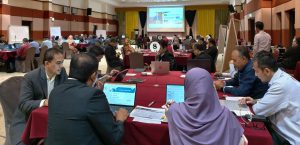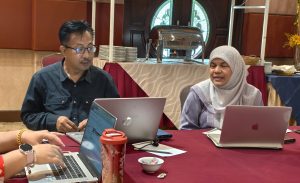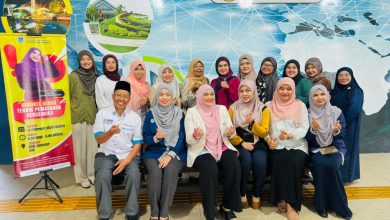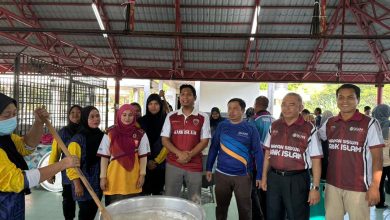UUM Enters Phase IV of Strategic Plan (2026–2030) to Fulfil National and International Agendas
SINTOK, 14 May 2025: Universiti Utara Malaysia (UUM) began its Strategic Plan journey in 2011 with Phase I and is now poised to usher in Phase IV (2026-2030), set to commence next year.

This Strategic Plan serves as the driving force in implementing, monitoring and ensuring the achievement of key agenda at both the international and national levels.
The Vice-Chancellor, Prof. Dato’ Dr Mohd Foad Sakdan, in his online address stated that the development planning for Phase IV must take into account international agendas, including QS World University Rankings, Times Higher Education (THE) Rankings, international accreditations such as AACSB, AUNQA, AMBA and EQUIS, as well as alignment with the Sustainable Development Goals (SDGs) and Environment, Social and Governance (ESG) principles.
Additionally, according to him, agenda at the national level requires attention, encompassing several key agendas namely the Higher Education Strategic Direction (Hala Tuju Pendidikan Tinggi, HTPT), MYMOHES, MyRA, OBB, the 13th Malaysia Plan, SETARA and the National Higher Education Blueprint (NHEBP).
He explained that all these agendas will impact a newly implemented system that has been introduced by the Ministry of Higher Education (MoHE), called the New Funding Formula (NFF) which allocates resources based on their performance.
“In pursuit of UUM’s ranking goals and institutional vision, the university will enhance the framework in its Phase IV Strategic Plan.

“In the Phase IV Strategic Plan, we will develop and implement measurement frameworks at three higher levels—namely Strategy, Focus, and the UUM Vision—compared to the current Phase III, which focuses primarily on Key Performance Indicators (KPIs) and Performance Indicators (PIs). This enhancement will bring the total number of measurement levels in Phase IV to four distinct tiers,” he stated during the Phase IV Strategic Plan Development Workshop (2026–2030) Series 2, held with the University Management Committee (JPU) and Heads of Departments at EDC today.
Prof. Dato’ Dr Mohd Foad Sakdan emphasised that in ensuring UUM’s Strategic Plan is successfully achieved, and ultimately realising its vision and mission of becoming the Eminent Management University and nurtures holistically developed leaders who serve the global community under its motto Knowledge, Virtue and Service, UUM’s objective must be clearly defined.
There are eight Core Policies and Strategic Directions which have been outlined and identified to guide the development of UUM’s Phase IV Strategic Plan for the next five years from 2026 to 2030, aligning efforts towards achieving UUM’s vision as a premier management university.
The eight policies and directions are Educational Management, Global Excellence (encompassing Academic, Student and Staff Achievement), R.I.C.E.S Excellence (Research, Innovation, Commercialisation, Entrepreneurship and Publication), Campus Sustainability or Living Campus (Strengthening Infrastructure and Infostructure), Financial Sustainability (Revenue Generation, Funding and Cost-Efficiency), Talent Development (Alumni, Student and Staff), Social Transformation (Community and Industry) and, Governance and Leadership.
He also elaborated on the contents of Phase IV Strategic Plan Development Workshop Series 1: held in conjunction with UUM Council of Professors organised by the Corporate Planning and Performance Division (BPPK), where the development and planning of the Phase IV Strategic Plan is being developed based on the Vision-Driven Planning approach.
He stated that, based on the outcomes of the workshop, a multi-level mapping strategy will be implemented to ensure that each action contributes meaningfully to achieving UUM’s vision.
The earlier UUM Council of Professors Workshop also identified three key focus areas that will serve as cornerstones for Phase IV Strategic Plan for the next five years, in support of UUM’s efforts to realise it vision, namely UUM Branding, Campus Sustainability and Talent.
“I am confident that with the collective wisdom of all participants in today’s session, we can jointly develop and determine the most effective strategies to achieve these three focus areas,” he said.
The workshop proceeded with a briefing by Director of BPPK, Prof. Dr Nor Aziah Abd Manaf, followed by group discussions.
Also in attendance, were Deputy Vice-Chancellor (Academic and International) Prof. Dr Mohd. Azizuddin Mohd Sani; Deputy Vice-Chancellor (Student Affairs and Alumni), Prof. Dr Ahmad Martadha Mohamed, and members of the University Management Committee





